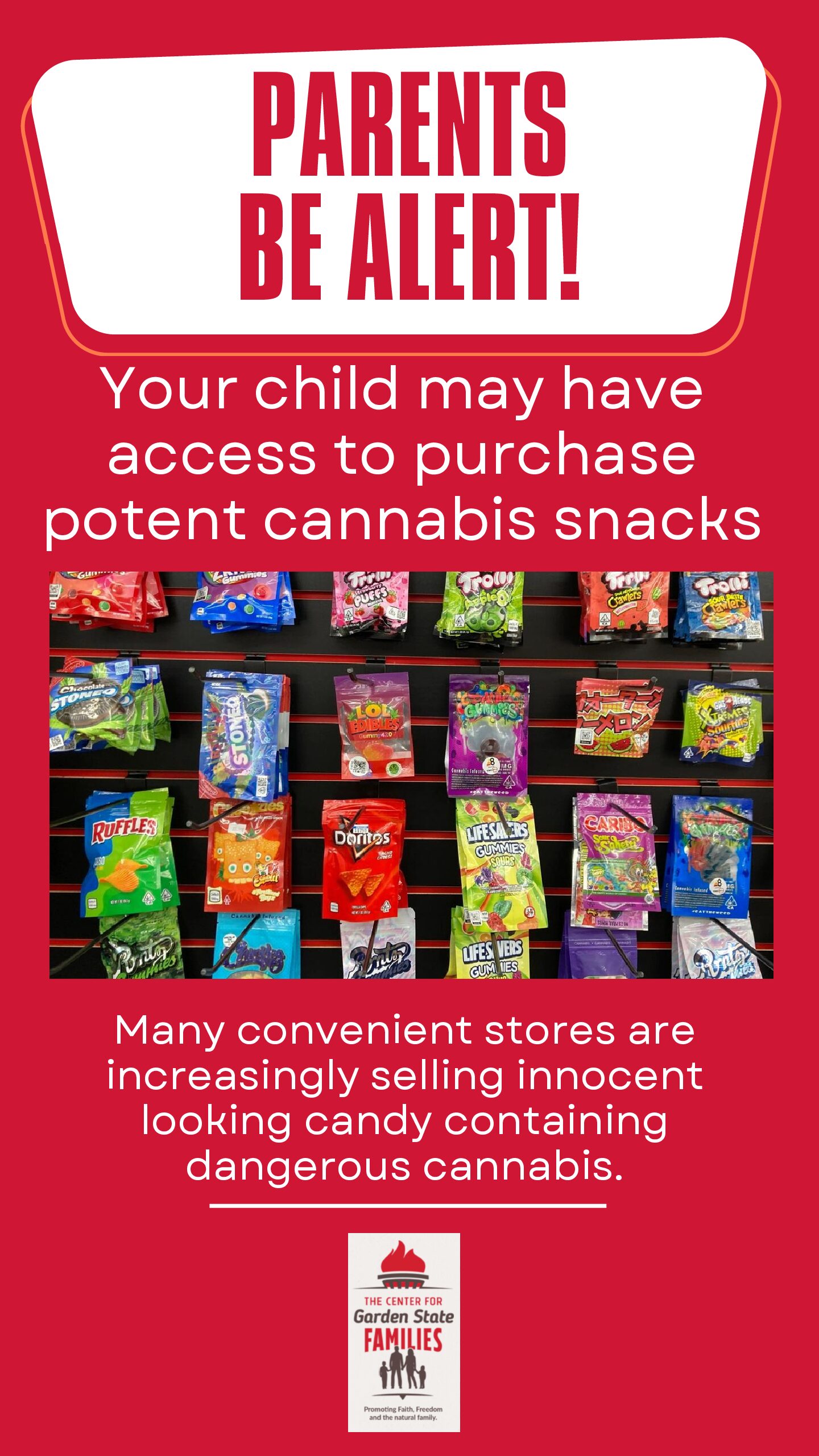Marijuana for Sale to Minors as Snacks
The Center for Garden State Families wants to alert you of a dangerous threat to your children.
Don’t let your child be a victim of cannabis (marijuana) “snacks.” Nearly indistinguishable from a normal bag of Doritos or Lifesavers, these edibles contain enough marijuana to incapacitate an adult. They pose a potentially lethal threat to children.
With the legalization of marijuana in New Jersey, there has been a rise in artificially synthesized cannabis edibles. The legalization of marijuana came with the opening of legal dispensaries. Despite the unspoken consensus to permit the use of all forms of marijuana, there is an increasingly popular trend to disguise cannabis consumption by infusing it into snack edibles. These products look nearly identical to the popular brands they are imitating.
These edibles can be found at many unlicensed gas stations or convenience stores. These stores are not required to have a license to sell marijuana due to technical differences in the products they sell. The amendment to the New Jersey Constitution that legalized “cannabis” was deliberately vague and has resulted in some surprising loopholes.
The marijuana plant’s main psychoactive component that causes the high feeling is known as THC delta-9. To legally sell in New Jersey any products containing THC delta-9 the store must be a registered and licensed cannabis dispensary. Convenience stores can sell cannabis edibles because they do not technically sell delta-9. Instead, they sell products containing THC delta-8, another psychoactive chemical found in cannabis but with much milder effects. THC delta-8 is naturally found in cannabis but in much smaller quantities. To have an equivalent effect to THC delta-9, producers of THC delta-8 edibles synthetically produce the psychoactive chemical and infuse it in high dosages.
The legality of these products is questionably protected by the 2018 Federal Farm Bill which removed “hemp” (another reference for marijuana) from the federal list of controlled substances. Depending on what definition of “hemp” one uses, it can be defined as “any cannabis plant that has less than 0.3% THC.” The protection of delta-8 edibles by the Farm Bill is a technicality that lawyers and scientists still debate.
A strong objection to these products arises from the fact that they are not scientifically tested to determine what psychoactive chemicals are contained in these edibles. According to testimony presented to the New Jersey Assembly Health Committee on June 5, 2023, Sarah Ahrens, the founder and chief executive of True Labs, a cannabis testing laboratory, explained that the analysis of delta-8 edibles led to extremely concerning conclusions. For example, the labels on these edibles are erroneous since they may contain various kinds of THC unmentioned. In addition, the laboratory analysis detected many unverifiable substances mixed with delta-8.
Even adult consumers who consciously purchase these items, cannot know exactly what they are consuming or getting high on. The results from True Labs also provide a legal objection to delta-8 edibles since they exceed the quantity of THC permitted by the 2018 Federal Farm Bill. Legally no product is allowed to contain more than 0.3% THC of its total weight; however, results show that delta-8 edibles may exceed this quantity by up to 1%. The full testimony of Sarah Ahrens on this subject can be found on this link from minute 1:05:20 to 1:10:45.
Parents should be aware of the threat these cannabis snacks pose to children. Cases of adverse reactions are increasing in the thousands nationwide, and it is happening in New Jersey. A case of accidental child consumption was reported in the committee hearing. Michael Gillespie gave compelling testimony regarding his fourteen-year-old son, who nearly died after casually purchasing and eating a bag of gummies from a convenience store. On June 5, 2023, Mr. Gillespie bravely shared his testimony with the legislative committee on this horrendous event.
On a cold February evening, his son was out with his friends and bought a bag of the typical Trolli gummies he grew up eating. Nothing on the bag but a small sticker on the corner would lead the minor to think he was about to consume harmful drugs. An experienced cannabis consumer would have known that you are only supposed to eat one or half a delta-8 gummy to feel high, but Michael ate the whole bag. He did not know that cannabis edibles can take up to 45 minutes to have an effect. He was at an ice cream parlor with his friends when his mind started to feel foggy. The dizziness and general aches led him to excuse himself for some fresh air. He realized his depth perception was off as he tried to focus on the passing cars. He wanted to get home but felt afraid in his present state. Instead, he opted to wait out the mental fogginess and started walking toward the woods where he stumbled and fell unconscious. The delta-8 had finally taken over his body.
When Mr. Gillespie drove to the ice cream parlor to pick him up, it did not take him long to realize his son was missing. He reported his missing child immediately and an amber alert was announced. It took volunteers, local police, fire department, and the state police eleven hours to find him in the freezing weather. The police officers that found him reported that the boy’s skin was blue and hypothermia was confirmed by doctors at the hospital. The blood work on Michael tested positive for THC. After ten hours of observation, Michael was released from the hospital. Although the effects of the cannabis had apparently worn off, it is still to be determined if there are any lasting long-term side effects. What is certain, though, is that the horror of such a desperate search for their child will never leave the memory of the Gillespie family.
Michael’s case is just one of thousands nationwide. It is not enough for parents to warn their children to stay away from drugs. The same candy brands that parents typically buy for children are now being copied and marketed containing dangerous levels of THC. The responsibility of parents to protect their children is becoming more difficult every day in our tolerant society.
Besides being diligent parents and scrutinizing what our children eat, parents must be proactive against the laws that permit such situations to happen in the first place. Would we have delta-8 candy in gas stations if New Jersey were not a pro-marijuana state? But most importantly, would New Jersey be a pro-marijuana state if we did not have legislators pushing that agenda?
To keep our children safe against cannabis snacks, we must elect legislators whose primary purpose is to protect children from harm. As concerned citizens of New Jersey, we cannot forget that we get the politicians that we deserve. If we truly care for the safety of our children, homes, and neighborhoods, the first step we must take is to vote and vote for people worthy of the position. It may be a burden for parents on election day, but it is a major line of defense against dangerous agendas being pushed on our society.
Watching what children eat and voting for pro-family candidates is key, but not sufficient. The Center for Garden State Families will be working with the Gillespie family for legislation requiring any purchase of natural THC products greater than 0.3 that remain legal to sell having an age requirement of 21 years old. We consistently remind the citizens of New Jersey, nothing can be done without prayer and God’s protection. “For God determines the number of the stars; He gives to all of them their names. Great is our Lord, and abundant in power; His understanding is beyond measure.” (Psalm 147-4:5)


1 Comment
This is atrocious! New jersey should wake up b4 the lawsuits start coming from parents like this. It’s time we sue the state for allowing things like this